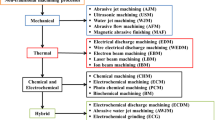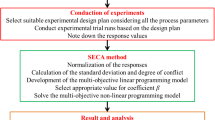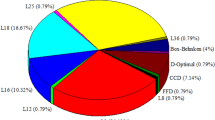Abstract
Traditional edged cutting tool-based machining processes are now being continuously replaced by nontraditional machining (NTM) processes so as to generate complex and intricate shapes on advanced and harder materials, like titanium, stainless steel, high-strength temperature-resistant alloys, fiber-reinforced composites, and engineering ceramics. These NTM processes, while using energy in its direct form for removing materials from the workpiece surfaces, have the capabilities of meeting some higher level requirements, such as low tolerance, high surface finish, higher production rate, automated data transmission, miniaturization, etc., and are also quite suitable in the areas of micro- and nano-machining. Selection of the most appropriate NTM process to generate a desired shape feature on a given work material is often a challenging task as it involves consideration of diverse machining characteristics and performance of the NTM processes. This paper explores in details the applicability, suitability, and potentiality of evaluation of mixed data method for solving the NTM process selection problems. Three illustrative examples are presented, which validate the usefulness of this method. The observed results exactly corroborate with those obtained by the past researchers.
Similar content being viewed by others
References
Jain VK (2005) Advanced machining processes. Allied Publishers, New Delhi
Pandey PC, Shan HS (1981) Modern machining processes. Tata McGraw-Hill, New Delhi
Cogun C (1993) Computer-aided system for selection of nontraditional machining operations. Computer in Industry 22:169–179
Cogun C (1994) Computer aided preliminary selection of non-traditional machining processes. Int J Mach Tools Manuf 34:315–326
Yurdakul M, Cogun C (2003) Development of a multi-attribute selection procedure for non-traditional machining processes. Proc I Mech E, J Eng Manuf 217:993–1009
Chakroborty S, Dey S (2006) Design of an analytic-hierarchy-process-based expert system for non-traditional machining process selection. Int J Adv Manuf Technol 31:490–500
Chakroborty S, Dey S (2007) QFD-based expert system for non-traditional machining processes selection. Expert Syst Appl 32:1208–1217
Chakrabarti S, Mitra S, Bhattacharyya B (2007) Development of a management information system as knowledge base model for machining process characterization. Int J Adv Manuf Technol 34:1088–1097
Das Chakladar N, Chakraborty S (2008) A combined TOPSIS-AHP method based approach for non-traditional machining processes selection. Proc I Mech E J Eng Manuf 222:1613–1623
Das Chakladar N, Das R, Chakraborty S (2009) A digraph-based expert system for non-traditional machining processes selection. Int J Adv Manuf Technol 43:226–237
Edison Chandrasselan R, Jehadeesan R, Raajenthiren M (2008) Web-based knowledge base system for selection of non-traditional machining processes. Malay J Comput Sci 21:45–56
Edison Chandrasselan R, Jehadeesan R, Raajenthiren M (2008) A knowledge base for non-traditional machining process selection. Int J Technol Knowl Soc 4:37–46
Sadhu A, Chakraborty S (2011) Non-traditional machining processes selection using data envelopment analysis (DEA). Expert Syst Appl 38:8770–8781
Das S, Chakraborty S (2011) Selection of non-traditional machining processes using analytic network process. J Manuf Syst 30:41–53
Chakraborty S (2011) Applications of the MOORA method for decision making in manufacturing environment. Int J Adv Manuf Technol 54:1155–1166
Temuçin T, Tozan H, Valíček J, Harničárová M (2012) A fuzzy based decision support model for non-traditional machining process selection, Proc. of ICMEM Conference on Manufacturing Engineering & Management, 170–175
Karande P, Chakraborty S (2012) Application of PROMETHEE-GAIA method for non-traditional machining processes selection. Manag Sci Letters 2:2049–2060
Martel JM, Matarazzo B (2005) Other outranking approaches. In: Figueira J, Salvatore G, Ehrgott M (eds) Multiple criteria decision analysis: state of the art surveys. Springer, New York
Chen T, Wang Y-C, Tsai H-R (2009) Lot cycle time prediction in a ramping-up semiconductor manufacturing factory with a SOM-FBPN-ensemble approach with multiple buckets and partial normalization. Int J Adv Manuf Technol 42:1206–1216
Hajkowicz S, Higgins A (2008) A comparison of multiple criteria analysis techniques for water resource management. Eur J Oper Res 184:255–265
Author information
Authors and Affiliations
Corresponding author
Rights and permissions
About this article
Cite this article
Chatterjee, P., Chakraborty, S. Nontraditional machining processes selection using evaluation of mixed data method. Int J Adv Manuf Technol 68, 1613–1626 (2013). https://doi.org/10.1007/s00170-013-4958-1
Received:
Accepted:
Published:
Issue Date:
DOI: https://doi.org/10.1007/s00170-013-4958-1




